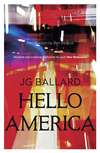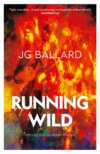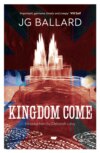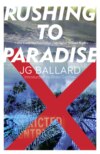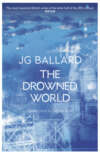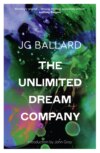Читать книгу: «Hello America»
J. G. BALLARD
Hello America

Copyright
Fourth Estate
An imprint of HarperCollinsPublishers
77–85 Fulham Palace Road
London W6 8JB
This edition published by Fourth Estate in 2014
First published in Great Britain by Jonathan Cape in 1981
Copyright © J. G. Ballard 1981
The right of J. G. Ballard to be identified as the author of this work has been asserted by him in accordance with the Copyright, Design and Patents Act 1988.
Introduction © Ben Marcus 2014
‘The Sage of Shepperton’ © Travis Elborough 2008
Author’s Note © J. G. Ballard 1994
A catalogue record for this book is available from the British Library.
This novel is entirely a work of fiction. The names, characters and incidents portrayed in it are the work of the author’s imagination. Any resemblance to actual persons, living or dead, events or localities is entirely coincidental.
All rights reserved under International and Pan-American Copyright Conventions. By payment of the required fees, you have been granted the non-exclusive, non-transferable right to access and read the text of this e-book on-screen. No part of this text may be reproduced, transmitted, down-loaded, decompiled, reverse engineered, or stored in or introduced into any information storage and retrieval system, in any form or by any means, whether electronic or mechanical, now known or hereinafter invented, without the express written permission of HarperCollins.
Cover by Stanley Donwood.
Photography by Hecate Moon.
Ebook Edition © JUNE 2010 ISBN: 9780007346967
Version: 2014-07-11
Table of Contents
Cover
Title Page
Copyright
Author’s Note
Introduction by Ben Marcus
1 The Golden Coast
2 Collision Course
3 A Drowned Mermaid
4 Secret Cargoes
5 To the Inland Sea
6 The Great American Desert
7 The Crisis Years
8 Thirstland
9 The Indians
10 The Starship
11 The Oval Office
12 Camels and A-Bombs
13 West
14 Wayne’s Diary: Part One
15 Giants in the Sky
16 Rescue
17 Across the Rockies
18 The Electrographic Dream
19 The Hughes Suite
20 Wayne’s Diary: Part Two
21 Crash-landing
22 The House of Presidents
23 The Sunlight Flier
24 A Graduate of Spandau
25 Siege
26 Titans and Cruises
27 Love and Hate
28 The War Room
29 Countdown
30 Execution Squad
31 Flight
32 California Time
The Sage of Shepperton
About the author
By the same author
About the Publisher
Author’s Note
The United States has given birth to most of our century’s dreams, and to a good many of its nightmares. No other country has created such a potent vision of itself, and exported that vision so successfully to the rest of the world. Skyscrapers and freeways, Buicks and blue jeans, film stars and gangsters, Disneyland and Las Vegas have together stamped the image of America onto the maps of our imagination.
Recently the American dream may have faded a little, exposed to the harsh reality of violent crime and decaying inner cities, but throughout the rest of the world the core appeal of the American way of life is as strong as ever. Above all, Hollywood still rules our entertainment culture, projecting a fictional image of America far more powerful than the reality.
Whenever I visit the United States I often feel that the real ‘America’ lies not in the streets of Manhattan and Chicago, or the farm towns of the Midwest, but in the imaginary America created by Hollywood and the media landscape. Far from being real, the sidewalks and filling stations and office blocks seems to imitate the images of themselves in countless movies and TV commercials. Even the American people one meets in hotel lobbies and department stores seem like actors in a huge televised sitcom. ‘USA’ might well be the title of a 24-hour-a-day virtual-reality channel, broadcast into the streets and shopping malls and, perhaps, the White House itself – certainly during the Presidency of Ronald Reagan, whose first year in office coincided with the original publication of Hello America.
Cadillacs, Coca-Cola and cocaine, presidents and psychopaths, Norman Rockwell and the mafia … the dream of America endlessly unravels its codes, like the helix of some ideological DNA. But what would happen if we took the United States at its face value and constructed an alternative America from all these images? The simulacrum might well reveal something of the secret agenda that lies beneath the enticing surface of the American dream.
A curious feature of the United States is that this nation with the most advanced science and technology the world has ever seen, which has landed men on the moon and created the supercomputers that may one day replace us, amuses itself with a comic-book culture aimed for the most part at bored and violent teenagers. In Hello America I suggest that the hidden logic of the American dream might one day lead to a President Manson playing nuclear roulette in Las Vegas, a less far-fetched notion than it seems, bearing in mind the Hollywood actor who occupied the White House through most of the 1980s, his head filled with the debris of old movies as he dreamed his Star Wars fantasies of laser-armed missiles.
Nonetheless, as the reader will find, Hello America is strongly on the side of the USA, and a celebration of its optimism and self-confidence, qualities that we Europeans so conspicuously lack. For all my fears of a President Manson, the story ends in the triumph of the nineteenth-century Yankee virtues embodied in my old glass airplane-building inventor. However hard we resist, our dreams still carry the legend ‘Made in USA’.
1994
Introduction
By Ben Marcus
Hello America might as well be called Goodbye America. Goodbye and so long, you monstrous, resource-sucking nation, who raped the land and air, imposed your hypocritical policies and cartoonish values every which where, and lowered the world’s collective intelligence through debased entertainment. Good riddance, and now let’s tour the corpse. This novel, more than any in his opus, is J. G. Ballard’s cruel eulogy to the country everyone loves to hate. America, we all know, has had it coming for a good while now. Since it first started to thrive, perhaps? In Hello America, that comeuppance has struck, and hard. The promised land has given way to wasteland, a blank slate. Welcome to the end times. Or is Ballard suggesting we need to wipe the great nation clean and start again, with a new group of well-meaning European explorers? Perhaps ‘hello’ is the correct word after all.
The novel opens to a dead America, the Statue of Liberty drowned in her own harbour. A group of explorers has come across the ocean to assess some worrying radiation levels. At first glance, our explorers find a New York that is covered in what looks like mounds of gold. Gold dust is spilling from buildings, running into the water. They’re rich! This is the American promise, writ not just large but gigantic, and their excitement is nearly childish. Of course this is Ballard, who would not reward his characters so soon, if ever. Their fates will not be resolved so easily. Up close, the explorers discover that this is not gold at all, but sand. America’s profligate way with all of the world’s resources has left it uninhabitable. Published in 1981, when America was still recovering from the oil crises of 1973 and 1979, Hello America is even more relevant, or terrifyingly accurate, today. Our sense of its premise’s inevitability quickly transforms the novel from sci-fi horrorscape to just another piece of domestic realism, plus some very appealing clone technology and ultra-sexy transparent flying machines late in the novel. The climate in this not-so-fictional world has been pitched on its head after the damming of the Bering Strait, and the explorers discover that not only did every American have to flee, they did so in a hurry. The metropolis is a desert. We can only guess at the wrenching weather that must have burned people out of their homes. The country is a graveyard of itself. This is perhaps just the cautionary tale we need as we lurch further into real, irreversible destruction, and since the hard-headed among us are not listening to science, why not let fiction commence its subtler, more sinister campaign?
Whatever kind of future Ballard is proposing here, it’s not one gifted with much remote intelligence, because each of our protagonists is filled not with hard facts about this failed part of the world, but with full-blown, unchecked fantasies of the America that awaits. Their scientific mission is quickly subsumed by more personal, mythological yearnings. In a place without people, a person can become whatever he wants. Even president. Although what one would be president of is never made especially clear. Leadership itself, in its pure form, as distilled prestige, is what one is meant to readily covet. For Ballard, instilling a character with a lifelong dream of becoming president is giving that character one of the greatest ambitions there is.
We know almost nothing about where our explorers have come from, only that Europe practised moderation with its resources and avoided America’s greedy, suicidal eco-disaster. If Europe survived, though, it would seem to be a pinched and thin survival, hardly worth the novel’s attention. It’s interesting to note that the explorers never think of home while in America, never wish they were elsewhere, and seem in fact to have no pasts to speak of at all. Their lives have begun anew in this strange place. Is this the powerful hold of the American dream, which has apparently outlasted the American reality? However fallen the new world is, however much it is a victim of its own excess, a new round of explorers would seem to prefer it, death-ridden as it is, to anything else on the planet. One begins to sense that underneath the clear and lurid scorn Ballard shows for what America had become, there simmers a circumspect romanticism, a longing for the place, however diseased it was. But for Ballard, romance and death are hardly ever separate. He has no trouble showing the allure of death. In his world, it’s better to throw one’s lot in with the crazy dreamers, however perilous the mission, than to conduct oneself more rationally, with modest and realistic hopes.
Still, Ballard does love to topple an icon, and here his destruction is as luscious, and perverse, as ever. A hollowed-out, depopulated America is a perfect playground for him. He needn’t trifle so much with characters when he can provide a running inventory of all that is gone, and one of the novel’s strongest currents is the endless account of those parts of America that no longer exist or no longer work. The book is a near-rhapsody of decline. Cities are sucked of life. Dust covers everything. Pools are empty, the lights are out, and the glass in buildings is warped or gone. Rarely has a writer seemed to take such glee in cataloguing what is missing in his narrative world, a kind of grave-dancing unparalleled in any other book I can think of.
The book bursts with American death, revels in it, in lieu, really, of any kind of old-fashioned character development. Ballard was long besotted with America, or, more specifically, with its cultural artefacts and over-hyped promise, the way it advertised itself through its exports. When the movie version of Crash was set to be filmed, Ballard applauded David Cronenberg’s decision to shoot the film in Toronto, bringing it closer to the land where cars were an ugly, compelling obsession. But if Crash was, in part, about death by car, Hello America is about the death of the car, and with it the American dream.
There is no page in this book that doesn’t vividly show how finished America is. If we often think that a novelist creates a world, it is more fitting to say that here Ballard, as he did so spectacularly in his disaster fiction, has destroyed one instead. The book makes rubberneckers of us readers, because who wouldn’t be fascinated by the destruction of a land and culture that, in our time anyway, feels so fatally dominant, so in need of humbling? For an American reader, it is about as close as one can get to attending one’s own funeral. We read with a full arsenal of emotions: fascination, fear, guilt, and glee. And as our explorers move west, we encounter Ballard’s real achievement: he has written a historical novel about the future. Hello America depicts a second discovery of America, this time by demented lunatics with destructive, conquering delusions of a place that would be empty and pointless but for their dreams of it. An abandoned America turns out to be the perfect landscape for his passionate, violent characters. If America is the great land of make-believe, then Ballard’s characters are the perfect torch-bearers for the life of the imagination. Even while the country itself has perished, Ballard shows us how it endures in fantasy, mattering perhaps more than the reality ever could.
New York, 2014
1 The Golden Coast
‘There’s gold, Wayne, gold dust everywhere! Wake up! The streets of America are paved with gold!’
Later, when they beached the SS Apollo against the derelict Cunard pier at the lower tip of Manhattan, Wayne was to remember with some amusement how excited McNair had been as he burst into the sail locker. The chief engineer gesticulated wildly, his beard glowing like an overlit lantern.
‘Wayne, it’s everything we’ve dreamed of! Look at it just once, even if it blinds you!’
He almost tipped Wayne from his hammock. Steadying himself against the metal ceiling, Wayne gazed at McNair’s inflamed beard. An eerie copper light filled the sail locker, surrounding him with bales of golden carpets, as if they had steamed into the eye of a radioactive hurricane.
‘McNair, wait! See Dr Ricci! You may be – !’
But McNair had gone, ready to rouse the ship. Wayne listened to him shouting at the two startled stokers in the coal bunker. While he slept through the afternoon – he had come off the long night watch at eight that morning – the Apollo had anchored half a mile from the Brooklyn shore, presumably to give Professor Summers and the scientific members of the expedition time to test the atmosphere. Now they were ready to make way again and enter New York harbour, their first landfall after the voyage from Plymouth.
Winches wheezed and grunted, the anchor chains dragged at the rusty bow plates. Wayne climbed from his hammock and dressed quickly, glancing into the cracked mirror that swung from the door. A golden face stared back at him, startled eyes under the blond thatch like a gawky angel’s. As he reached the deck a cloud of soot-flakes fell from the funnel and covered the glowing fore-sail with hundreds of fireflies. Crew and passengers crowded the rail, waiting impatiently while the antique engines of the Apollo, clearly exhausted by the seven-week voyage across the Atlantic, laboured against the slack coastal water.
Annoyed with himself – already he was trembling with excitement like a child – Wayne looked out at the magnetic coast. An immense golden sheen lay over the Brooklyn shoreline, reflected from the silent quays and warehouses. The afternoon sun hung above the deserted Manhattan streets, adding its light to the glittering field below. For a moment Wayne almost believed that these long-silent avenues and expressways had carpeted themselves with the rarest treasures in preparation for just his visit.
Behind the Apollo was the massive span of the Verrazano Narrows suspension bridge, long familiar to Wayne from the ancient slides in the Geographical Society library in Dublin. He had gazed for hours at the photographs, as he had at a thousand other images of America, but he was unprepared for the spectacular size and mysterious form of the bridge. In some way it had managed to exaggerate itself during the long century it had been forgotten by everyone else. Many of the vertical cables had snapped, and the huge, copper-hued structure, covered with rust and verdigris, resembled a recumbent harp that had played its last song to the indifferent sea.
Wayne stared at the approaching city, again unable to reconcile the scene in front of him with the image of the Manhattan skyline he had day-dreamed over in the darkness of the library projection room. Dozens of towers rose through the afternoon light. Even at a distance of three miles the glass curtain-walling of these huge buildings glowed like bronze mirrors, as if the streets below them were stacked with bullion. Wayne could see the old Empire State Building, venerable patriarch of the city, the twin columns of the World Trade Center, and the 200-storey OPEC Tower which dominated Wall Street, its neon sign pointing towards Mecca. Together they formed the familiar skyline whose peaks and canyons Wayne knew by heart, and which now seemed transformed by this dream of gold.
He listened to McNair shouting at the stokers through the engine-room portholes below him.
‘Good God, you’ll need more than your shovels! It must be six inches deep, blown all the way from the Appalachians!’
Wayne laughed aloud at the golden shore, caught up by McNair’s excitement. Although only twenty-five, a mere four years older than Wayne, McNair liked to affect a distracted, world-weary manner, particularly when showing anyone round his detested engine-room, with its coal-fired boilers, bizarre pistons and connecting rods straight out of the nineteenth century. Still, McNair knew his stuff, and could make anything work. Give him a lever and he would move the world, if not the SS Apollo. Edison and Henry Ford would have been proud of him.
And for all his strange humour, McNair had been the first to befriend Wayne after the young stowaway was found by Dr Ricci, shivering under the canvas awning of the captain’s gig two days out from Plymouth. It was McNair who had interceded with Captain Steiner, and moved Wayne’s hammock from the damp scullery behind the galley to the dark warmth of the sail-locker. Perhaps McNair saw in Wayne’s determination to reach the United States something of his own intense need to get away from a tired and candle-lit Europe with its interminable rationing and subsistence living, its total lack of any flair and opportunity.
Nor was McNair alone in this – the Apollo carried an invisible cargo of dreams and private motives. As the funnel showered smuts on to their heads, the passengers on either side of Wayne were pointing silently to the golden coasts of Manhattan, Brooklyn and the Jersey shore, awed by this glittering welcome from a long-forsaken continent.
Then Wayne heard little Orlowski, the expedition leader, calling impatiently to Captain Steiner for more steam. Orlowski’s voice had temporarily lost the American accent that had snaked in over his Kiev vowels during the voyage. Through his miniature pocket megaphone he bellowed:
‘Full ahead, Captain! We’re all waiting for you! Don’t change your mind now…’
But Steiner, as always, was taking his own time. He stood in the centre of his bridge beside the helmsman, legs well apart, calmly contemplating the golden shore like an experienced traveller outstaring a mirage. A stocky, compact man with curiously sensitive hands, he was now in his mid-forties, and had served in the Israeli Navy for nearly twenty years. Keen chess-player who never gave away a move, amateur mathematician and expert navigator, he had intrigued Wayne from their first meeting, as he peered up from the overturned gig into the Captain’s wry gaze.
Wayne was certain that Steiner, like everyone else on board the Apollo, harboured secret ambitions of his own. After his discovery in the rowing-boat, the Captain had ordered Wayne down to his cabin. As Steiner locked away Dr Ricci’s confiscated pistol in the safe, Wayne had glimpsed a neatly tied bundle of ancient Time and Look magazines on the shelf below the bullion box. Their brown pages were compressed like copper leaf, fossils of an America that had vanished a hundred years ago. Then, two weeks out of Plymouth, during one of the long calms, Steiner called Wayne back to his cabin after the stowaway had brought his supper from the galley.
‘It’s all right, Wayne…’ Steiner smiled with some amusement at this seaborne Tom Sawyer, with his thatch of blond hair, legs like stilts, eyes lit by all kinds of strange dreams. Wayne was trembling with excitement as he faced the Captain – both Ricci and Professor Summers had been urging Orlowski to re-route the Apollo’s passage so that they could put Wayne ashore at the Azores.
‘Wayne, calm down. You look as if you’re about to take over the ship.’ Could he already see Wayne’s aggressiveness in his broad shoulders, in the thickening bones of his forehead and jaw? ‘You’ll be glad to hear we’re not calling in at the Azores. But I want to show you something else.’
Leaving his supper uneaten, Steiner opened the safe and quietly unwrapped the Time and Look magazines. He turned the faded pages, showing Wayne the illustrations of the Cape Kennedy Space Center, the Space Shuttle landing at Edwards Air Force Base after a test flight, and the recovery of an Apollo capsule from the Pacific. There was a special bicentennial supplement celebrating every aspect of American life in the long-ago 1970s – the crowded streets of Washington on Carter’s Inauguration Day, long queues of holiday jets on the runways of Kennedy Airport, happy vacationers lying by the swimming-pools of Miami, raking the ski-slopes of Aspen, Colorado, fitting out their yachts in a huge marina at San Diego, all the enormous vitality of this once extraordinary nation preserved in these sepia photographs.
‘Well, Wayne, you want to go to America. Let’s see how much you know about it.’ Steiner sounded sceptical, but nodded encouragingly as Wayne moved from picture to picture:
‘That’s easy—the Golden Gate Bridge; Caesar’s Palace in Las Vegas; LA—Mann’s Chinese Theatre; Fisherman’s Wharf in Frisco; Detroit—the Edsel Ford Expressway. Any more, Captain?’
‘Not for now, Wayne. But that’s very good, you’re a stowaway with a difference. We’ll have to work together…’
Not one in a thousand Europeans of Wayne’s age would have had the faintest idea what these ancient scenic views represented. Sadly, Europe, Asia and the rest of the populated world had long since lost interest in America. But clearly Steiner had guessed that Wayne would recognise them. As he locked away the magazines he remarked:
‘With luck you’ll be seeing them soon. Tell me, Wayne, from where in the United States did your family originally come?’ He glanced at Wayne’s long-boned figure, child-like straw hair. ‘Kansas, the Midwest somewhere? You look like a Texan…’
‘New England!’ Wayne lied before stopping himself. ‘Jamestown. My great-grandfather ran a hardware store.’
‘Jamestown?’ Steiner nodded sagely, careful not to smile as he beckoned Wayne to the door. ‘Well, you’re going back to the beginning, all right. Perhaps you’ll start everything up again, Wayne. You could even be President. From stowaway to the White House, stranger things have happened.’ He gazed thoughtfully at Wayne, his shrewd, navigator’s face almost serious, set in a curious expression Wayne was to remember for ever.
‘Think, Wayne – the forty-fifth President of the United States…’
Бесплатный фрагмент закончился.

